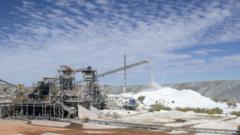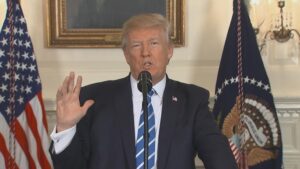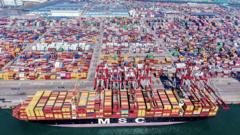With China's recent export restrictions on rare earth elements, Australia's government is stepping up to potentially reshape global supply dynamics for critical minerals.
Australia's Strategic Push for Rare Earths Amid China's Export Restrictions

Australia's Strategic Push for Rare Earths Amid China's Export Restrictions
As China's grip on rare earths tightens, Australia proposes a bold plan to restore balance.
In a bold move amidst escalating global tensions, Australian Prime Minister Anthony Albanese has pledged to allocate A$1.2 billion (£580 million) towards establishing a strategic reserve for crucial minerals, positioning Australia as a key player in the rare earths landscape. This announcement comes in the wake of China's decision to limit exports of seven essential rare earth elements, which are vital for advanced tech production, including electric vehicles and military applications. Widely interpreted as a retaliatory measure against U.S. tariffs imposed by former President Donald Trump, China's restrictions pose a significant challenge to Western nations already struggling to secure a reliable supply of these critical resources.
Albanese emphasized the need to prioritize key minerals that bolster both Australia's security and that of its international partners. However, the real question remains: can Australia realistically challenge China's current dominance in this arena? Rare earths, a set of 17 elements known for their complex extraction and refining processes, are crucial to technologies that are expected to dominate the future economy.
While Australia boasts substantial deposits of rare earths and other essential minerals like lithium and cobalt, China currently controls about 90% of global rare earth refining capacity. Beijing's stranglehold on this sector has raised alarm bells among Western powers as they contemplate the potential ramifications on defense capabilities and technological advancement.
China has maintained that its export limitations are a direct response to U.S. tariffs on Chinese goods, with significant concerns regarding Washington's reliance on Chinese supplies for military-grade materials. According to the U.S. Geological Survey, between 2019 and 2022, 75% of U.S. rare earth imports originated from China.
Experts emphasize the urgency for Western nations to assert their independence from China's influence. Philip Kirchlechner, director of Iron Ore Research in Perth, Australia, warned that past inattention to the importance of rare earths allowed China to monopolize refining, putting the West, especially the U.S., in a precarious position.
Tesla's CEO Elon Musk recently spotlighted the impact of China's export limitations on the development of the company’s humanoid robots, underscoring the widespread ramifications of these controls on American businesses.
Albanese's proposed reserve aims to ensure that mined minerals will support both domestic industry and international allies, notably the U.S. and EU. While the plan is seen as a necessary step, analysts caution that merely stockpiling resources will not dissolve the central issue; refining remains predominantly under China's control.
Despite Australia's leadership in lithium mining, where it produces 33% of the world's supply, the actual refining process largely occurs in China, emphasizing Australia's challenge. The country is working to enhance its refining capabilities, as evidenced by recent investments like the A$840 million funding for Arafura Rare Earths in Perth. Yet, experts predict that Australia may still rely on China for significant refining operations until at least 2026.
As discussions unfold, the geopolitical landscape remains fraught, with China keen to exploit any economic volatility resulting from U.S.-Australia relations. Analysts note that Albanese's proposal isn't merely reactive; it’s a sophisticated maneuver that includes the strategic selling of Australia's resources to mitigate price control previously exerted by China.
The overall implications of these developments paint a complex picture of the struggle for dominance in the critical minerals sector, raising pivotal questions about future collaborations and the West's readiness to diminish its reliance on Chinese supply chains.


















